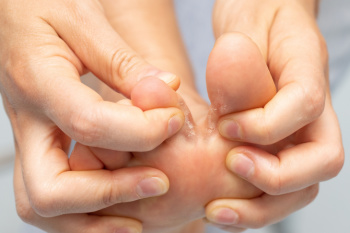6734 Lankershim Blvd
North Hollywood, CA 91606

Athlete's foot, or tinea pedis, is a fungal infection that commonly affects the skin on your feet, often starting with a red, itchy, and scaly rash between the toes. This condition thrives in warm, damp environments, making places like gym locker rooms, swimming pools, and public showers prime spots for picking it up. The fungus flourishes when it comes into contact with the skin in moist conditions, such as sweaty feet trapped in damp socks or shoes. Symptoms can range from mild itching and burning to peeling skin, and in severe cases, blisters or painful ulcers. For mild cases, antifungal creams, powders, or sprays can provide relief. However, the best defense is keeping your feet clean and dry, changing socks regularly and choosing breathable footwear can make a big difference. To prevent athlete's foot, always wear shower sandals in public areas, dry your feet thoroughly after washing, and avoid sharing towels or shoes. If symptoms persist or worsen, it is suggested that you make an appointment with a podiatrist for expert treatment.
Athlete’s Foot
Athlete’s foot is often an uncomfortable condition to experience. Thankfully, podiatrists specialize in treating athlete’s foot and offer the best treatment options. If you have any questions about athlete’s foot, consult with Dr. Jennifer Woo from California. Our doctor will assess your condition and provide you with quality treatment.
What Is Athlete’s Foot?
Tinea pedis, more commonly known as athlete’s foot, is a non-serious and common fungal infection of the foot. Athlete’s foot is contagious and can be contracted by touching someone who has it or infected surfaces. The most common places contaminated by it are public showers, locker rooms, and swimming pools. Once contracted, it grows on feet that are left inside moist, dark, and warm shoes and socks.
Prevention
The most effective ways to prevent athlete’s foot include:
Symptoms
Athlete’s foot initially occurs as a rash between the toes. However, if left undiagnosed, it can spread to the sides and bottom of the feet, toenails, and if touched by hand, the hands themselves. Symptoms include:
Diagnosis and Treatment
Diagnosis is quick and easy. Skin samples will be taken and either viewed under a microscope or sent to a lab for testing. Sometimes, a podiatrist can diagnose it based on simply looking at it. Once confirmed, treatment options include oral and topical antifungal medications.
If you have any questions, please feel free to contact our office located in North Hollywood, CA . We offer the newest diagnostic and treatment technologies for all your foot care needs.